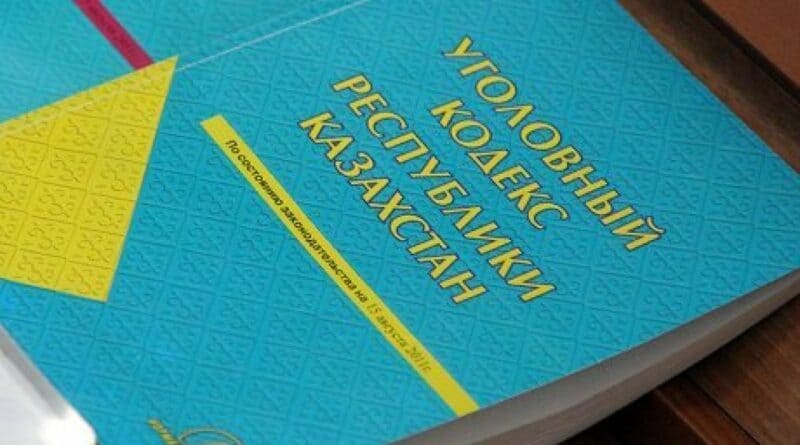Human rights activists of Kazakhstan demand decriminalization of the Article for defamation
The Prosecutor General’s Office of Kazakhstan published on its website a draft law “On amendments and additions to certain legislative acts of the Republic of Kazakhstan on the improvement of Criminal and Criminal Procedure Laws”. As noted in the explanatory note to the draft, “an analysis of the work under the new Criminal and Criminal Procedure Law confirms the availability of additional reserves for further humanization of the criminal law, simplification and acceleration of the criminal process, as well as strengthening the policy of zero tolerance for offenses”. Despite this, the project has already been criticized by public figures.
The main dissatisfaction of human rights defenders represented by the International Foundation for the Protection of Freedom of Speech “Adil Soz” was caused by the amendments to Part 2 of the Article 130 “Defamation” of the Criminal Code of Kazakhstan. In the current edition, the Article is stated as follows:
“Defamation committed publicly or using the media or telecommunication networks shall be punishable by a fine of up to two thousand monthly estimate indicators, or by correctional labor in the same amount, or by restriction of liberty for a term of up to two years, or imprisonment for the same term”.
It should be noted that the monthly estimate indicator in Kazakhstan for 2019 is $6.5. So, the maximum fine for defamation today is a little more than 13 000 US dollars.
According to the amendments of the Prosecutor General’s Office, the fine is proposed to be reduced by 10 times – up to 200 monthly estimate indicators, that is, up to 1300 US dollars. It would seem a great occasion for joy. However, the fund “Adil Soz” thinks otherwise.
“Kazakhstan has been repeatedly recommended by international human rights organizations to decriminalize defamation and insult,” the fund notes. “The Kazakh authorities have repeatedly promised to bring the regulations on freedom of expression into correspondence with international standards. For example, before and during the chairmanship of Kazakhstan in the OSCE, the government assured that defamation would be excluded from the Criminal Code. In 2010, Kazakhstan adopted the recommendations of the UN Human Rights Council regarding the decriminalization of defamation and insult by 2014. In 2011, President of Kazakhstan Nursultan Nazarbaev told in interview with the newspaper “Washington Post” that the country would decriminalize defamation.
“We are listening to our growing civil society on the issue of accelerating changes in the culture of respect for rights and freedoms. For example, we will make defamation as a civil and not a criminal offense in order to promote freedom of speech and come into correspondence with the best international practices,” Nazarbaev said.
However, as stated in the Foundation “Adil Soz”, the Kazakh authorities not only did not fulfill their promises to the international community, but, moreover, they toughened the liability for defamation in the Criminal Code (version of 2015).
“This is what is said in the response signed by the Interdepartmental Working Group to non-governmental organizations proposing to decriminalize defamation: “In our opinion, decriminalization of defamation and insult will not promote freedom of expression, but will lead to an increase in malicious attacks on the honor and dignity of citizens, which is not consistent with the provision of the International Covenant on Civil and Political Rights on respect for the rights and reputation of others in realizing the right to freedom of expression,” the Foundation “Adil Soz” cites the position of supporters of toughening the punishment. “But this statement contradicts the fundamental documents of international organizations and national practice.”
The fund recalls that the European Court of Human Rights has repeatedly stated that in the context of political debate, criminal censorship will most likely block criticism and also “prevent the press from fulfilling its mission as a provider of information and an independent observer.”
“Judicial practice also refutes the public danger of defamation,” the Foundation “Adil Soz” emphasizes. “According to the materials of the Committee on Legal Statistics and Special Records of the General Prosecutor’s Office of Kazakhstan, in 2016-2017, 1314 courts were held against about 2000 people on charges of defamation. According to the sentences, 93 people were recognized as slanderers. In 2018, the courts received 962 cases in respect of 1167 persons; 19 people have been convicted of defamation in media.”
In this regard, “Adil Soz” strongly recommends that the Kazakh authorities transfer responsibility for deliberate defamation to the sphere of Civil Law and/or exclude punishment for defamation in the form of imprisonment.
It is also worth noting that today in the capital of Kazakhstan the first meeting of the National Council of Public Confidence (NNOD) was held, which included political scientists, economists, public figures and activists. The NSOD was created on the initiative of the President of Kazakhstan, Kassym-Zhomart Tokayev, and its meetings are held with the direct participation of the head of state. The issue of inappropriate punishment for defamation was also raised at this meeting. As lawyer Aiman Umarova, one of the NSOD members, noted, international organizations have repeatedly criticized the Kazakh authorities for vague wording in the articles of the Criminal Code.
“Nobody understands who, when, and for what is excited, but the terms give more than five years! – turned to President Umarova. – International organizations have repeatedly criticized the Kazakh authorities for the vague wording of the article “incitement to social, national, tribal, racial, estate or religious hatred”, according to which in recent years dozens of civil activists, journalists, bloggers and representatives of various religious communities have condemned. We need to change the judicial system, there must be honest people, professionals in their field. ”




